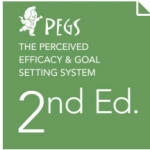Perceived Efficacy and Goal Setting (PEGS)

Summary
The Perceived Efficacy and Goal Setting (PEGS) system is an instrument designed to enable young children (ages 5-9 years) to self-report their perceived competence in everyday activities and to set goals for intervention. The PEGS was developed by Nancy Pollock, Mary Law and Cheryl Missiuna at McMaster University.
Using a set of cards that show self-care, school and leisure activities, children identify the activities that are challenging for them and those they are motivated to work on. Parallel questionnaires for caregivers and educators allow for multiple perspectives to be considered in collaborative goal setting.
Upon the completion of PEGS, the therapist has information about the child’s perceived competence performing everyday activities, his or her priorities for intervention, and the perspectives of a few adults in the child’s life. This information can be used to work with the child and his or her family to create a meaningful and engaging treatment program. By using PEGS with the child, therapists can truly practice from a client-centered philosophy.
The PEGS is now in its 2nd edition, it features all new drawings for the cards, new items that reflect cross-culturally appropriate activities, and test forms redesigned for clarity.
Applications
- Evaluation use
- Academic studies
- Treatment programs
Advantages
- Available in English and Portuguese
- Licensed to individuals and to organizations
The package includes:
The package includes: PEGS Manual, 54 colourful cards, Caregiver and Educator questionnaires, Child Score Sheet and 2 Placemats.
Contact
MILO Business Development

